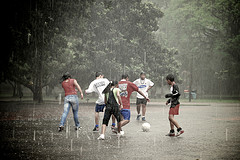Phones, tablets, and laptops are wonderful tools to stay connected and informed, but we need to be careful not to let them become distractions from real life interactions and most importantly our responsibilities.
Au Pairs – Imagine for a moment that you went to the hospital and you were in the care of doctors and nurses. How would you feel if those doctors and nurses who were there to care for you were more interested in texting or using their personal computer than caring for you? How would that make you feel, about yourself and about them? Would you think that you were getting the treatment you deserved? Would you feel like paying the bill after your stay?
Life as an au pair, it is a fine balance between employee and family member. You live with your host family and participate with them as a member of the family, but you also have clear responsibilities as a childcare provider. Being a childcare provider is truly one of the most important jobs I can think of, because you are helping to shape our next generation. What message are you sending them when you would rather interact with a computer than with them? How will they feel about themselves and about you? Children feel as though everything is about them. They will see this as a rejection of them and they will be more likely to act out.
It also poses a safety concern when you are not paying enough attention to the children in your care. Accidents happen, but when an adult care giver is close by and appropriately supervising the chances of a major injury dramatically reduce.
During work hours, the following would not be considered acceptable:
-Texting
-Talking to friends on the phone
-Chatting with friends online
-Using Skype or FaceTime
-IMing
-Emailing
-Updating your status on Facebook
-Using Snapchat, WhatsApp or any other app or social media site
-Watching videos on YouTube
-Tweeting on Twitter
-Uploading photos on Instagram
-Anything else on the computer unless it is going to Nickjr.com together with your host children
Think about this — even if you work 45 hours a week, that leaves you 123 hours per week for all of that other stuff, or about 70 hours (if you are getting the recommended 7-8 hours of sleep per night.)
Host Parents – You need to be clear about what you consider acceptable during work hours to avoid misunderstandings. Also, please understand that you are dealing with a new generation of people who are very accustomed to being plugged in at all times. Their intention is not to be rude, they don’t necessarily realize how their actions will be perceived. Please use this information as an opportunity to begin a dialogue on the issue.






 How much you eat is just as important as what you eat. You want to experience life in the U.S., but don’t feel compelled to pick up bad habits. Stick to the portions you would normally eat. The U.S. is known for its “supersizing”, especially in restaurants. It is OK to ask for a to-go box and take home that food you couldn’t finish at the restaurant.
How much you eat is just as important as what you eat. You want to experience life in the U.S., but don’t feel compelled to pick up bad habits. Stick to the portions you would normally eat. The U.S. is known for its “supersizing”, especially in restaurants. It is OK to ask for a to-go box and take home that food you couldn’t finish at the restaurant. As you may be aware, the public school children will be off several days in September and October. These are regular workdays for an au pair, unless your host parents tell you otherwise. As with any “school holiday” start making plans for activities with the kids now.
As you may be aware, the public school children will be off several days in September and October. These are regular workdays for an au pair, unless your host parents tell you otherwise. As with any “school holiday” start making plans for activities with the kids now. Almost everyone experiences culture shock when they come to a completely new environment. Everything is different: the language, the food, and the people.
Almost everyone experiences culture shock when they come to a completely new environment. Everything is different: the language, the food, and the people. Au pairs are required to complete 6 credits or 8 CEUs or 72 or more hours.
Au pairs are required to complete 6 credits or 8 CEUs or 72 or more hours.